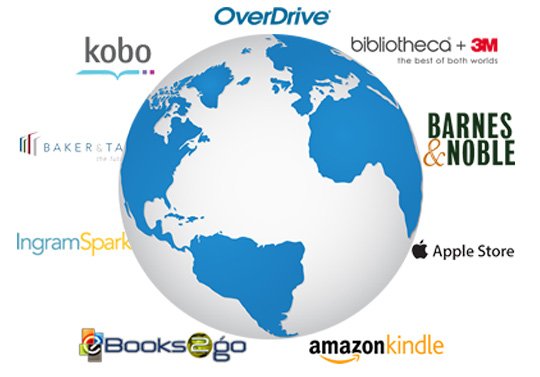Self-publishing is a powerful route for writers aiming to control their own publishing journey. With numerous ebook publishing platforms available, choosing the right one can feel daunting. This guide provides insights to help aspiring authors and indie publishers identify a platform that aligns with their goals and maximizes their reach.
Understanding Ebook Publishing Platforms
Publishing platforms give authors the freedom to publish without relying on traditional publishing houses. These platforms differ widely, providing various features, pricing structures, royalty options, and audience access. Every platform has unique advantages and limitations for an eBook writer looking to publish.

Key Factors to Consider When Choosing an Ebook Publishing Platform
· Royalties and Costs
Royalties and costs are crucial when evaluating ebook publishing platforms. Most platforms operate on a royalty system, giving a percentage of each sale back to the author. For instance, Amazon KDP offers up to 70% royalties for ebooks priced between $2.99 and $9.99. However, the royalty rate can vary widely depending on the platform, book price, and any exclusive agreements you might need to enter. Some platforms charge fees for specific services, like acquiring ISBNs or marketing assistance, which can impact your overall earnings.
· Distribution and Reach
The reach and distribution of a platform determine how widely your book can be accessed. Platforms like Amazon KDP provide extensive global reach, while others, like Kobo Writing Life, have a strong international presence in specific markets. Some platforms support multiple formats, including print-on-demand options, making your book available in physical form as well. This can be a valuable choice for authors who want their work accessible in multiple formats.
· Ease of Use
A user-friendly platform is essential for an efficient publishing experience. Some platforms offer intuitive interfaces and straightforward upload processes, making it easy for an eBook writer to navigate. Reliable customer support is also important, especially for those who are new to self-publishing and might need guidance. Platforms that prioritize user experience can help simplify the publishing process, allowing you to focus more on your content.
· Marketing and Promotional Tools
Marketing is crucial to boosting your book’s visibility. Many ebook publishing platforms offer built-in promotional tools to help with this. For example, some platforms provide options to run discount campaigns, create landing pages, or even advertise on the platform itself. These tools can be helpful for new authors and indie publishers looking to build an audience. Platforms with advanced marketing features, like analytics tracking, allow authors to better understand their readers’ preferences and adjust their marketing strategies accordingly.
· Control and Flexibility
The amount of control you have over pricing, rights, and distribution is another important factor. Some platforms, such as Amazon KDP’s KDP Select, require exclusivity for a specific period. While this can sometimes increase visibility within the platform, it limits your ability to publish on other publishing platforms. If retaining complete control over pricing and distribution rights is a priority, look for platforms that allow for non-exclusive publishing options.
Popular Ebook Publishing Platforms Overview

1. Amazon Kindle Direct Publishing (KDP)
Amazon KDP is one of the most popular publishing platforms due to its extensive reach and competitive royalty structure. It offers authors up to 70% royalties on eligible ebooks and allows for print-on-demand services. However, the KDP Select program requires exclusivity, which might limit distribution options. For authors who want to maximize their reach and royalties within a single platform, Amazon KDP is often a top choice.
2. Barnes & Noble Press
Barnes & Noble Press is a non-exclusive platform that caters to both ebook and print formats. It allows authors to retain full control over their pricing and distribution rights, making it a flexible option. Although its distribution network is not as large as Amazon’s, Barnes & Noble Press still has a dedicated audience, particularly in the U.S. market.
3. Kobo Writing Life
Kobo Writing Life is ideal for authors targeting an international market, especially in Canada and Europe. It offers a straightforward publishing process and non-exclusive agreements, allowing authors to distribute their books widely. However, it has less penetration in the U.S. market, which could be a disadvantage for some eBook publishers seeking a broader reach.
4. Apple Books
Apple Books is known for its quality user experience and a strong base of loyal customers. It offers non-exclusive agreements, allowing authors to publish on multiple platforms. However, Apple Books requires specific formatting that can be complex, which may require additional steps for authors unfamiliar with the technical requirements.
Choosing the Best Platform for Your Needs
· Reach and Visibility
If reaching a broad audience is a primary goal, platforms with expansive distribution networks, like Amazon KDP, may be ideal. KDP’s reach and promotional tools allow authors to gain visibility in a competitive market. On the other hand, platforms like Kobo Writing Life are more suitable for eBook publishers focused on specific regions, such as Canada or Europe.
· Royalties and Earnings
For authors prioritizing earnings, comparing royalty rates and cost implications is essential. Platforms like Amazon KDP offer a potentially high royalty rate within a specific pricing range. For authors who prefer non-exclusive agreements, platforms like Barnes & Noble Press allow for wider distribution while still offering competitive royalties.
· Market Specificity
Different platforms have unique strengths in particular markets. Kobo Writing Life, for example, is known for its strong presence in Canada and other international markets. Authors seeking to publish in regions with niche demands should consider these factors to select the platform best suited for their target audience.

Conclusion
Selecting the right publishing platform is a crucial decision that can shape the success of an author’s publishing journey. Aspiring authors and indie publishers can find a platform that aligns with their publishing objectives. Each platform has its strengths and weaknesses, and choosing one that resonates with your vision will enhance your publishing experience. By thoughtfully considering these aspects, authors can confidently navigate the ebook publishing platform and maximize their book’s potential.


